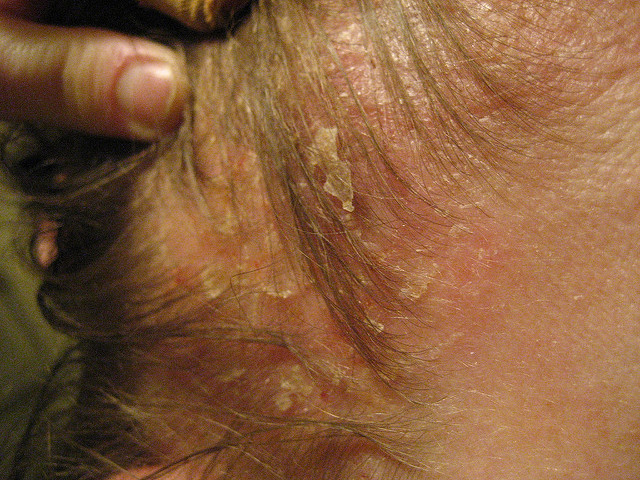The image you see above is a microscopic picture of human dandruff. You have probably heard of dandruff, or cradle cap in infants. Perhaps you suffer from the annoying white flakes yourself. Often, the itchy patches of dandruff are caused by a skin disorder called seborrheic dermatitis. Seborrheic dermatitis can affect any oily areas of the body, but it most commonly targets the scalp. The skin condition typically manifests itself as red or yellow, flaky, scaly, and potentially itchy patches on the affected areas of skin.
There is no singular cause for seborrheic dermatitis. Instead, it seems to be caused by various conditions, such as:
- Stress
- Genetics
- Yeast, a type of fungi
- Certain medications
- Cold, dry weather
- Abnormal oil glands
Image Source: Dr. Milton Reisch
Unfortunately, there is no cure for this condition; only the symptoms can be treated for temporary relief. It is likely, however, that the patches will return even after treatment. Nevertheless, there are a variety of treatment options. One line of treatment uses corticosteroids, like hydrocortisone, to target inflammation. Typically, the corticosteroids are available as a cream or shampoo. Another line of treatment consists of antifungals. These may come in the form of pills (terbinafine), shampoos (Ketoconazole), or lotions (Clobetasol). Shampoos, like Head and Shoulders and Selsun Blue, contain selenium sulfide (an antifungal drug) and are often used as alternatives to prescription medications. Finally, antibacterial creams, like Metrolotion, may also help to soothe itching and to treat seborrheic dermatitis.
In general, it is important to wear light, breathable clothing to maintain air circulation around your body and scalp and to wash your hair and skin regularly to reduce oil buildup. Finally, avoid scratching or picking at the scales; doing so can lead to irritation and a potential infection.
While seborrheic dermatitis can be a difficult and sometimes embarrassing condition to deal with, there are a large variety of treatment options through corticosteroids, antifungals, and antibacterial products. Nonetheless, if your seborrheic dermatitis or dandruff begins to interfere with your normal everyday activities, consider seeking a dermatologist for more information and advice on handling this condition based on your lifestyle and skin type.
Feature Image Source: IMG_9316.jpg by adaenn










